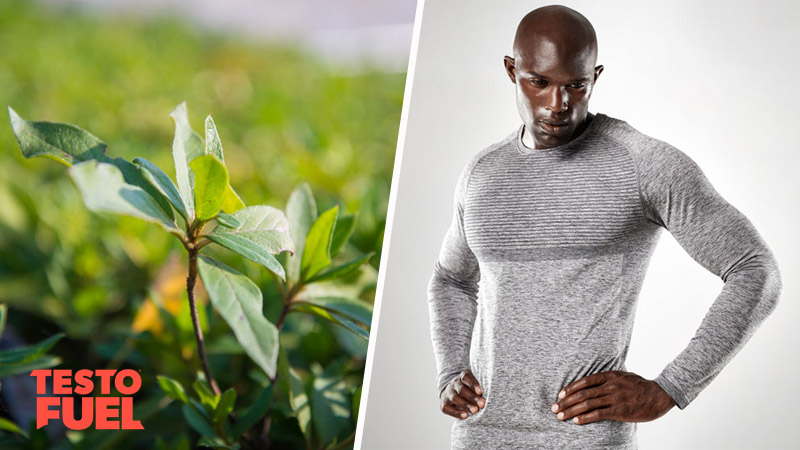TestoFuel Blog : Make Gains & Pack on the Muscle

When you’re wanting to pack on muscle, ramp up your strength or elevate your endurance you need to attack your lifestyle from all angles. You need to train hard in the gym, eat a balanced diet and take the right supplements.
In this article we take a look at one of the lesser known herbal supplements, fadogia agrestis – an ingredient used in an increasing number of T booster supplements.
Is it really an effective testosterone booster? Or is the research misleading?
Read on to find out…
Otherwise known as black aphrodisiac and Baakin gagai, fadogia agrestis is a Nigerian bush plant from the Rubiaceae family.
It is characterized by its yellowish leaves and stem, tomentose appearance and rather short 1-3 foot high stature [1].
Like with many plants and herbs, fadogia contains a number of bioactive compounds, with the stem in particular being high in various phytochemicals including alkaloids, saponins and glycosides. It is particularly common in developing countries as a traditional, medicinal herb.
The main active component seem to be alkylamide glycosides – a class of molecules not often seen in testosterone boosters.
Primarily as a fertility aid.
Fadogia isn’t the most commercially available supplement ingredient but it has been anecdotally reported to improve symptoms of:
All in all, it’s well known as a ‘sexual invigorator’ in traditional African medicine.
And because testosterone is so closely linked to reproductive health and sexual performance, this has led to bodybuilding and sports companies trying to market the aqueous plant extract as a testosterone booster.
But that doesn’t necessarily mean that science backs it up as an effective male supplement.
So is there a link between fadogia agrestis and testosterone? Or is it a another case of anecdotes and traditional medicine folklore steering the evidence?
Let’s take a look…
Key Point: Fadogia agrestis is an African plant that has been used to treat low sex drive as well as a range of markers of sexual performance.
Fadogia is an interesting but very understudied herb.
To date, all research conducted on it has been completed on animals with no human research to draw upon. And even that research is questionable.
Study #1: [2]
This study, published in the Asian Journal of Andrology in 2005, evaluated the use of the black aphrodisiac plant on male albino rats.
The rats were dosed with varying amounts of an extract of fadogia in order to assess its potential as a sexual stimulant.
The authors of the study reported that testosterone did increase in a dose dependant way, and they theorized that this might be down to the bioactive saponin content of the plant.
Lead author Yakubu suggested that the extract might be used to modify impaired sexual function… but specifically in animals.
The above study is the reason why some supplement manufacturers jumped on the band wagon with the herb and added it to their T boosters. But can a lone study in animals really justify spending your hard earned cash?
Study #2: [1]
The same research team conducted a similar study in 2008. They presumably wanted to do a validity test based around the surprising results from their initial study.
Using the same doses as before, Yakubu and his team gave varying doses of a fadogia extract to another set of male rats – this time over a 28-day period.
The results were probably not what the team were expecting – testosterone levels increased slightly at the beginning of the study, but then dropped dramatically at day 5 – to below the baseline levels recorded at the start of the study.
It goes to show that if you base your supplement ingredients around just one animal study, then it’s probably not a good plan. Yakubu and team found what they thought to be an effective testosterone boosting nutrient from their first research study, but when it was followed up by a re-test study, the results just weren’t replicated.
Not only does fadogia have a poor research profile, it could also be unsafe too.
The 2008 Yakubu study not only reported a dip in testosterone levels, but potential for the extract to be toxic to testicular tissue too. At doses above 18 mg per kilogram of body weight, fadogia was found to have an adverse effect on testicular function.
It also decreased levels of some alkaline phosphates whilst at the same time increasing testicular weight by 11-15% – a change thought to be indicative of cytotoxicity.
As you can imagine, it will be hard to gain ethical approval to conduct human trials using fadogia based on these adverse effects.
We strongly advise that you avoid this supplement and focus your attention on nutrients that have a stronger clinical trial background.
As a premium-grade, all-natural testosterone booster, TestoFuel provides the building blocks your body needs to ramp up hormone levels.
Containing only clinically dosed and researched ingredients, this state-of-the-art supplement has the ability to: